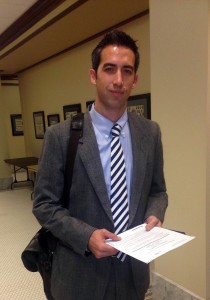SALT LAKE CITY — Its early morning in Ogden in January 2012 and most people in the neighborhood are sleeping, except for a team of cops about to enter a home on a raid searching for marijuana.
What ensued after the cops entered was a series of shots fired. In Jan. of 2012 a gun battle between Ogden resident, Matthew David Stewart and members of the Ogden Police force broke out over the raid. The final result was death of Ogden Police Officer Jared Francom and multiple bullet wounds sustained on both sides. Stewart was taken into custody where he was held until May 5, 2013 when found dead hanging in his jail cell, according to police records.

HB70 seeks to modify the procedures law enforcement use when executing so-called “no-knock” warrant and forcibly entering a home. Supporters want to avoid a deadly repeat of the Stewart standoff.
Rep. Mark C. Roberts, R-Santaquin, the bill’s sponsor, said, “We’ve seen a lot in the news lately not only in Utah but across the country, events searches and warrants being served in homes that have not ended well. They’ve been the wrong homes and things like that and so the whole idea is to … slow down the process a little bit so we can protect lives on both sides.”
Robert’s bill seeks change the standard under which a forcible entry warrant may be issued. HB70 will do this by changing the standard to issuing a forcible entry warrant from “reasonable suspicion” to “probable cause,” which according to Marina Lowe of American Civil Liberties Union is the legal standard used to issue a regular warrant.
In addition to changes in the language concerning the law, police officers would be required to, “demonstrate why law enforcement officials cannot use less invasive or confrontational methods” and to “describe investigative activities … prior to executing the search or arrest to ensure that the correct building has been identified.”
Connor Boyack, president of the Libertas Institute, the organization responsible for pitching the idea for the proposed law, said, “It’s a bit odd that in many states forcible entry or home raids are a very prevalent thing and there are problems all of the time, and yet in Utah with only our limited problems we’re kind of first in the nation to start really trying to push on this.”
Boyack cited a 2001 study by Peter Kraska, a criminologist at Eastern Kentucky University who found roughly 40,000 SWAT deployments for forcible entry searches are conducted around the country each year, or around 100 per day.
The bill passed the House Judiciary Committee on Feb. 18.




